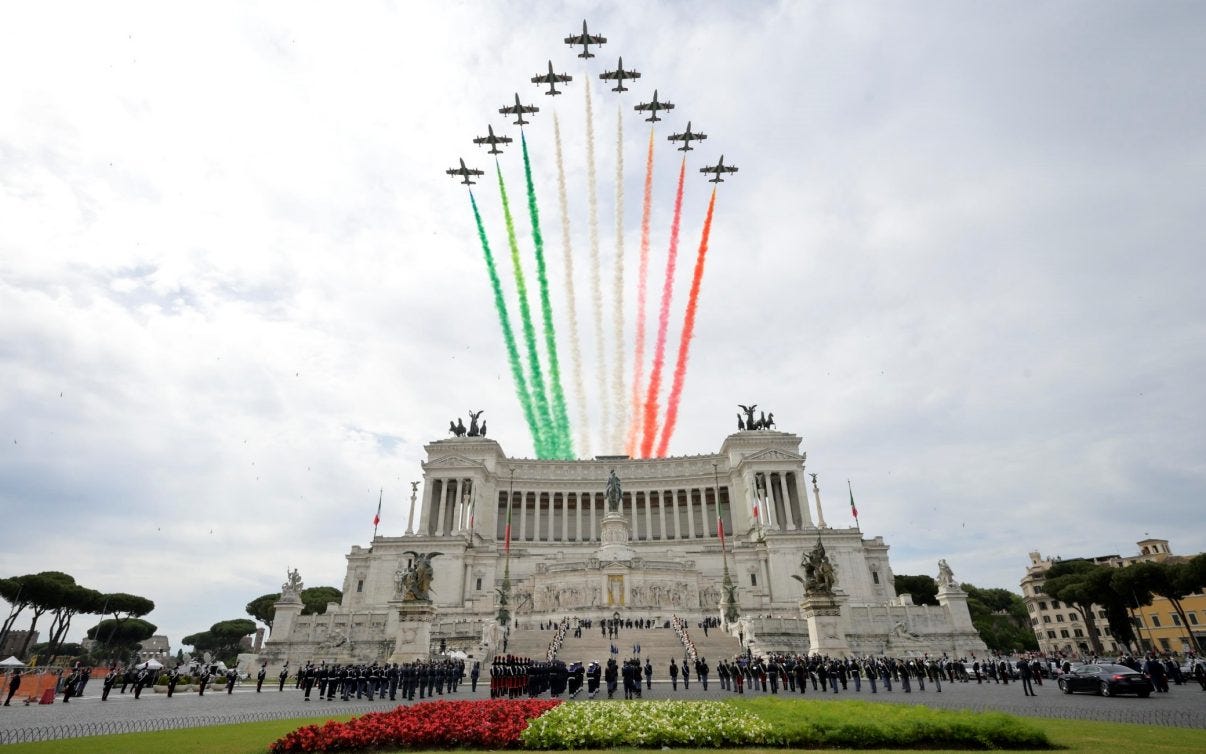Republic Day: the Overthrow of the Monarchy and the Advent of Women's Suffrage
Sometimes enlightenment comes all at once or not at all
Today, June 2nd, is Festa della Repubblica or “Day of the Republic” here in Italy, one of many holidays in this festa-loving country. Not unlike France’s Bastille Day on July 14th or the 4th of July in the United States, June 2nd is generally accepted as the birthday of the Italian Republic—but it’s so much more.
As the years go by, the historical significance of any national day of celebration tends to lose traction on the popular imagination. We forget, for instance, the significance of Labor Day in the U.S. To most people, it’s just a holiday, a bracket to Memorial Day, one bearing little relationship to its original purpose, which was to honor the American Labor movement.
So, too, Italy. Festa della Repubblica has a lot more gravitas to it than simply watching Italian president Mattarella lay a laurel wreath in front of the Altare della Patria (“Altar of the Homeland”). It’s more than the ceremonial homage paid to the Milite Ignoto (“Unknown Soldier”). It’s more than fighter-jet flyovers "(Frecce Tricolore) in twenty-one Italian cities that send a thrill up your spine.
Festa della Repubblica was, and is, a rebirth.
The holiday began in 1946 after the fall of the fascist regime. A referendum was called to decide whether Italy should remain a monarchy or become a republic. It was a massive turning point for a country that until recently had been little more than a compendium of duchies, kingdoms, and city-states. Italy wasn’t “Italy” until 1861. To this day, I marvel at the boldness of their vision.
Italy deposed its royal family, the House of Savoy, on June 2, 1946, and became a republic. The outcome of that historic referendum was due to women being, at long last, allowed to vote in national elections. Before then, women had only been allowed to vote locally. Now, they were tasked to cast their votes and exercise their political clout in a way never before seen in Italy.
To be clear, women still weren’t allowed to hold office. If no men vied for the position, then sure, perhaps, but it didn’t happen frequently. Not until 1963 were Italian women allowed to run for office, hold office, or serve as members of Parliament.
Lest any Americans reading this feel morally superior, Black women weren’t allowed to vote in the United States until the year 1965, which is when we passed the Voting Rights Act. That’s less than fifty years ago.
This is how the historical events leading to Festa della Repubblica managed to move Italy into the 20th century. A glorious day, wouldn’t you say? And for even more inspiration, be sure to watch the following video. The frecce tricolore fly overhead with the three colors of the Italian flag around the 4-minute mark.
Happy Festa della Repubblica.
Do you have an opinion about this holiday or its equivalents in other countries? I want to hear from you. Be sure to leave your comments below.
Copyright © 2022 Stacey Eskelin



I've always hated nationalism, possibly because I've seen up close in Serbia what it can do when it metastasizes into a malignant force. That said, a celebration of what makes a country unique is a great way to bring people together. There's the shared history, suffering, and sacrifice that makes a place what it is, and no matter where you are, all three things are there in varying quantities.
During my travels, I've always enjoyed watching people celebrate who and what they are. It's fun to watch their pride of place and the love the have for their shared story. We may take that for granted here, but other countries whose struggles are more recent understand more intensely what it is that they're celebrating.
1946 saw both women voting and women being elected. In fact, on June 2nd people both voted for the referendum and to elect the members of a temporary unicameral parliament (Constituent Assembly) whose duty was to write the new Constitution. That day saw the election of 21 women, and some of them would become extremely important personalities continuously elected into the 1990s. Once the Constitution was ready, in 1948 a general election was held for the first republican legislature (Chamber of Deputies and Senate) which led to the election of 49 women, and so on in later legislatures. In other words, women could run for office and be members of Parliament way before 1963 which instead was the year women were allowed to participate in the competitive exams to become magistrates. However, the most remembered year is 1965, i.e. when those who passed the 1963 exams entered service as judges, prosecutors, etc. after their training period. Today half the magistrates are women.